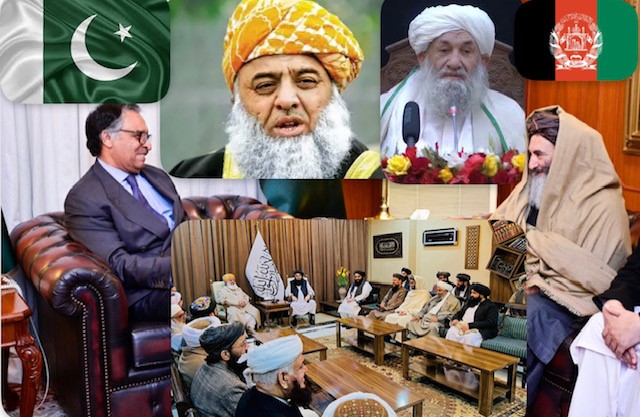

Dr. Naveed Elahi
Two positive high-level meetings have ignited a flicker of hope for rapprochement between the estranged neighbours, Pakistan & Afghanistan. Conversely, some analysts believe that early breakthrough is still a far cry. First, Haji Mullah Shirin, the governor of Kandahar, and Deputy Head of Military Intelligence and Strategy of Afghanistan, travelled to Islamabad and had meeting with the Foreign Minister of Pakistan, Jalil Abbas Jilani and attended the Pakistan-Afghanistan Joint Coordination Committee (JCC) meeting. Special Envoy on Afghanistan Ambassador Asif Durrani led the Pakistani side. Official sources said that their talks lasted over three hours where issues ranging from the banned Tehreek-e-Taliban Pakistan (TTP), border security, deportation of undocumented Afghans and other issues were discussed.
The statements issued by both, FM Jilani and Governor Shirin, intentionally avoided explicitly addressing sensitive issues, demonstrating a deliberate effort to prevent the escalation of tensions. According to the statement released by the Foreign Office, FM Jilani and Governor Shirin discussed “critical matters of shared interest,” encompassing “peace and security,” along with interactions between people.
Later, Maulana Fazlur Rehman, the leader of JUI-F, along with a nine-member delegation comprising party leaders from Khyber Pakhtunkhwa and Balochistan, visited Kabul for meeting with senior Afghan Taliban leaders. This visit took place at the invitation of the Afghan Taliban leadership to discuss regional and security issues. Maulana Fazlur Rehman reportedly addressed Pakistan’s security concerns with the Afghan Taliban while also lent ear to their grievances, expressing confidence in bridging the gap between the two sides and resolving issues. He met Afghanistan’s acting Prime Minister, Mullah Mohammad Hasan Akhund, and discussed these matters with him. PM Akhund clarified his country’s stance, emphasizing that Afghanistan did not intend to cause harm to any neighboring countries, including Pakistan. He explained that Afghanistan follows Islamic Sharia, which prohibits causing harm to others, and called for an end to what he described as the “cruel attitude” of the Pakistani government towards Afghan refugees. He was referring to the illegal Afghan refugees who are being sent back to Afghanistan. He emphasized the need to find ways to resolve issues and avoid practices that could escalate tensions. Nevertheless, the Afghan PM and spokesperson Zabihullah Mujahid shied away from talking about TTP and its terrorist activities in Pakistan.
Maulana Fazalur Rehman understands the Afghan Taliban disposition very well and must have expected little from them, but he lived in optimism and stressed that the purpose of his visit was to remove mistrust between Pakistan and Afghanistan, conveying a message of solidarity to Afghanistan. In a hope against hope, while the delegation’s visit primarily focused on engaging with the Afghan government, it expected to have meetings with certain leaders of the Pakistani Taliban (TTP) during their stay in Afghanistan. But it didn’t take place.
TTP is the main irritant in Pakistan Afghanistan relations. Since the Taliban takeover of Kabul in 2021, there has been a 60 per cent increase in terrorist incidents in Pakistan. TTP continues to operate from Afghanistan to plan and carry out attacks in Pakistan. As long they are harboured on Afghanistan soil, the bitterness in the relations between the two countries will not peter out. Rather it can escalate at any crucial time. Afghan high ups should realise the severity of the matter. Support to TTP terrorist group amounts to undermining the stability and security of Pakistan. TTP and its affiliated groups are already involved in killing of more than 500 Pakistanis and as many law enforcement personnel this year. Afghan Taliban’s sympathy and support to them is quite evident.
Afghan PM’s statement reflects little change in their approach to accommodate Pakistan’s grouse against TTP-propelled terrorism in Pakistan. Strangely, Afghan strategy is to gain maximum benefit without showing any flexibility on TTP issue. During the last two and half years they have stubbornly supported TTP and rebuffed Pakistan’s repeated appeals to bridle them. Even Haji Mullah Shirin, the governor of Kandahar, during his meeting with the foreign minister of Pakistan did not show any willingness to bridle TTP.
It has not gone unnoticed that the Afghan Taliban have been persistently trying to convince Pakistan, quite cheekily, to ensure uninterrupted continuity of trade between the two countries and keep the borders open for free movement of their citizens, irrespective of the ferocity and frequency of terrorist acts carried out by the TTP terrorists. Ironically, Afghan government’s spokesperson Zabhiullah Mujahid mocked Pakistan’s complaints and claims after horrendous terrorist attacks by TTP which caused huge losses of lives of LEA personnel and innocent civilians. This attitude compelled Pakistan to reconsider its reconciliatory approach. The involvement of Afghans in suicide attacks and target killings further forced Pakistan to adopt a strict policy towards Afghanistan. While these high-level meetings hoped for better relations between the two countries, there have been attacks on police and LEAs in Kohat, Bannu, Miranshah and Lakki Marwat, during these days, resulting in the deaths of several policemen and soldiers. TTP claimed responsibility for the attack at Kohat.
Though little flexibility is expected from the Afghan Taliban government, Pakistan ought to strive to come out of the taxing imbroglio of toxic relations with Afghanistan. Pakistan cannot afford to tackle the twin-headed hydra of hostile Eastern and Western borders at the same time. Besides, Pakistan should not let the Indian hawks revel in schadenfreude and satisfaction over this situation. The comprehensive policy approach requires maintaining active engagement with the Taliban government, enhancing people to people contacts, addressing matters such as efficient border control, the rights of residents on both sides of the border, bilateral and transit trade, the repatriation of undocumented refugees, and to top all, the imperative to plug the unbridled TTP forays against Pakistan. Of course, resorting to unilateral actions on any of these issues should be considered as a final recourse. This comprehensive policy approach, emphasis on diplomatic solutions, and a measured stance on unilateral actions can underscore Pakistan’s commitment to regional stability and the pursuit of positive relations with Afghanistan, even in the face of expected challenges.
Author is editor of The Strategic Brief



